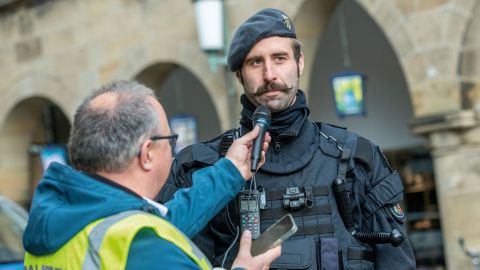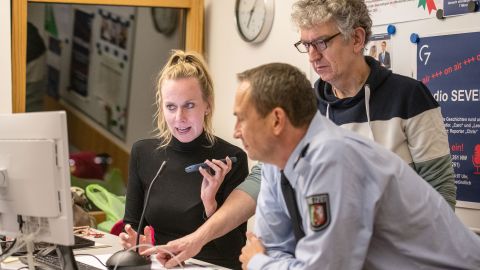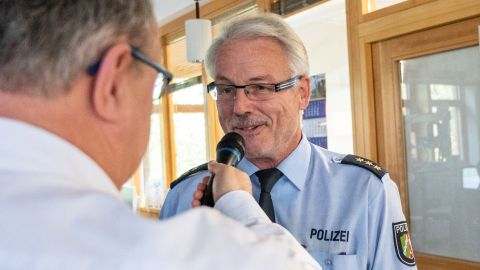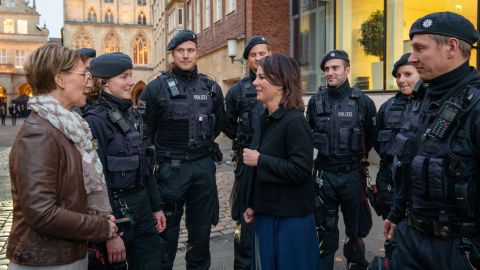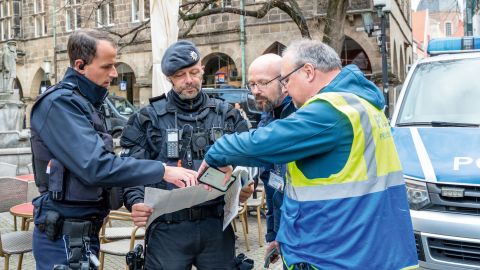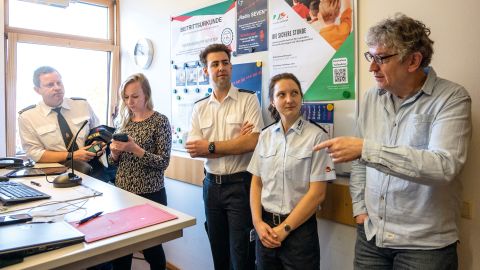There's not much going on in the streets of Münster on Wednesday morning. There is no sign of the important meeting in the town hall that is due to take place in a few hours. While the German Foreign Minister and guests from the seven leading industrialized nations are still packing their files, police officers and employees are already taking their positions. The threads are coming together at the police headquarters on Friesenring.
40 press and public relations colleagues from all over NRW take their seats. The police attach great importance to communication and transparency. They tweet and post, make statements in front of international media cameras and accompany official visitors. If suspicious objects appear at the side of the road, not only the defusing officers but also the press spokesperson teams have to be on site quickly. The aim is to create understanding for closures and restrictions. During the three days of the G7 summit, visitors to certain areas of the city will need a good reason to enter sensitive areas. Rallies, traffic jams - everything that such a high-level political meeting entails is also on the agenda in the Westphalian city of Münster.
Our own 3,800 employees are also happy to receive information outside of the chain of command. The colleagues are always in the middle of such BAO situations and yet are on the outside: As is well known, the information comes together in the command groups and the command staff. On the street, everyone can only assess their own operational section.
That's why Subsection 2 of the Operational Press and Public Relations Department (EPÖA) provides information via an internal police messenger and makes the wave: "Radio Seven", always seven minutes after full and seven minutes after half on radio channel 261. It's in the operations manual. Blue posters are displayed at all meeting points for colleagues, in the corridors of the police headquarters and at the food counters. The new channels do not replace management structures, but rather supplement the radio and telephone.
The press and public relations offices in the police headquarters form the broadcasting center and online editorial office. On one side on the second floor, the messenger channel is fired up, while the radio team broadcasts opposite. Leonie Lagrange and Martin Weide-Drees usually speak for the Warendorf and Steinfurt district police authorities. While Münster is eagerly awaiting the meeting of the foreign ministers, they are testing the improvised "radio" technology: the jingle comes from the cell phone, the interview clip from the iPad. Both are held in front of a radio microphone and combined with a few casual sayings to create a broadcast. Professionals can improvise and accept the challenge. One eye is always on the second hand.
In their "former lives", the trained radio editors spent half the day in the studio, often spreading good humor in the early hours of the morning. Leonie Lagrange most recently presented at Radio Westfalica and Radio Herford. "I was always a radio girl," enthuses the presenter. "I actually wanted to join the police as a child," she reveals. But it was only two years ago that she discovered the job advertisement for the police press office in the district of Warendorf. "I didn't hesitate for a second." She even gave up her previous dream job as a radio presenter for it.
Her co-host at the microphone of "Radio" Seven Martin Weide-Drees has 25 years of radio service under his belt: almost 5 years in Bavaria and then around 20 years at RADIO RST in Rheine. "At 53, I wanted to do something new again." So he switched sides and has since been speaking not only about, but also for the police in the Steinfurt district.
The third member of the team, Christof Hüls, is a field reporter. As an editor, he used to provide the material for printed local and online news and worked in or around Dortmund and Frankfurt. Even in this life, he enjoyed being outside and producing reports. In 2018, he joined the press office of the Märkischer Kreis district police authority as its third man.
Instead of a notepad and camera, he is out and about in Münster with smartphones and a microphone in the area between the castle and the Atlantic Hotel, where most of the foreign ministers are staying. He shuttles between the conference venue in the town hall and Münster-Osnabrück Airport, between meetings, LAFP NRW and the presidency, with a police officer who knows the area at the wheel of the civilian car and a photographer.
The three government employees form the core of the radio team. But no radio team can do without the colleagues behind the scenes. At "Radio Seven", these include Detective Chief Inspector Viola Groß and Police Chief Inspector Ralf Hövelmann. They promoted the idea of a BAO radio station and convinced superiors of the project. Viola Groß: "The idea actually came about before a planned BAO for a Castor transport. The Castor didn't come, so there was no radio. But now the opportunity is here."
Wednesday afternoon, at 2.07 pm sharp, "Radio Seven" goes on air. Incidentally, the jingle was played by the state police music orchestra. Police Commissioner Alexandra Dorndorf then welcomes the external emergency services in particular. Leonie and Martin introduce themselves and the program: "We'll be at your side for three days. We'll be sharing colorful stories, your experiences, news, things about this operation that concern you."
And give a little hint: "This is only for internal police use and for you, not for the public." Then the first minute is up. The maximum speaking time on police digital radio also applies to radio broadcasters.
With every broadcast, word gets around that Münster is making waves this time. After the first statements from the police headquarters, the first colleagues outside have their say. Thomas Hidding at the central catering point gives an insight into the menu. Anna-Leah from EZ20 in Bruchsal greets us in the broad Baden dialect: "Servus zusammen ... und guten Dienscht! Tschau, tschau!" Bavaria, Bremen, Saxony and Hesse also have their say later on.
A local colleague describes the great understanding of the population for the measures. A platoon leader from the technical relief organization outlines the tasks of the federal authority (setting fences, providing light). Police doctor Dr. Diana von Werden reveals that she has already helped out with forgotten medication and massaged colleagues with back problems.
Martin and Leonie also provide facts: They unpack what's in the food bag that day. At 8.07 pm, the jingle trills over the channel for the last time on this kick-off day.
On Thursday and Friday at 9.07 am, the program continues with interviews, conversations and entertaining information non-stop until the goodnight greeting at 8.07 pm. Police Chief Superintendent Simon Kaminski takes the opportunity to be asked about his Schutzmann moustache. Once a year, he and other colleagues celebrate "Movember" and collect money for a good cause. Many a colleague "celebrates" his birthday at the G7 summit and should not go unmentioned. AutobahnProfi Police Chief Superintendent Thorsten Baumann conducts the Italian escort through Münster and explains what can happen on the road. Outside reporter Christof Hüls provides a good 20 live impressions and sound bites from colleagues, paramedics, firefighters and other people affected, such as the landlord of the Markt Café.
57 broadcasts of one to three minutes in length were to be produced in the end - a full program and a high number of hits, even for experienced radio producers.
On Friday afternoon, Police Commissioner Alexandra Dorndorf briefly meets Foreign Minister Annalena Baerbock. At Münster-Osnabrück Airport there is a final photo with the police: the US delegation's plane takes off from there in the evening. At 8.07 pm, Leonie and Martin also say goodbye and: "We hope we were able to entertain you a little."
